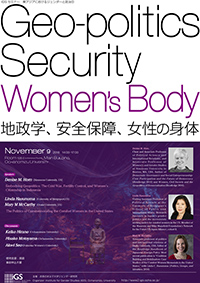9 NOV, Seminar “Geo-politics Security and Women’s Body”
15 OCT, Seminar “Globalization and Dislocation from Feminist Perspective: Dialogues with Saskia Sassen”
14 OCT, Symposium “Arab Women and Transgression: At the Boundary of Good and Bad”
30 JUN, Symposium “Promoting Future Women Leaders in Politics”
21 FEB, Symposium “Singlehood, Living Alone and Work-Life Conflict in Japan”
9 FEB, Closed Seminar, “Are Market Conditions Better in Achieving Gender Equality than Politics? “
26 JAN, Symposium, “Overcoming hurdles to women’s political representation”
22 JAN, Seminar, “The Implications of ARTs on Family and Kinship in Iran”
18 JUL, Seminar, “The Size of History:Small Worlds, Big Worlds, and the People Caught in Between”
2 JUN, Symposium “Democracy’s Poster Girls”
25 APR, Symposium “Gender Equality in the Happiest Country”
November
IGS Seminar(No.12, Gender and Politics in East Asia), “Geo-politics Security and Women’s Body”
Date: Friday, 9 November, 2018, 14:00-17:00
Venue: Room 135, Main Building, Ochanomizu University
Facilitator: Ki-young Shin (IGS, Ochanomizu University)
| Speakers | Denise M. Horn(Simmons University, US) Embodying Geopolitics: The Cold War, Fertility Control, and Women’s Citizenship in Indonesia |
| Linda Hasunuma (University of Bridgeport, US) and Mary M McCarthy(Drake University, US) The Politics of Commemorating the Comfort Women in the United States |
|
| Discussants | Keiko Hirano (IGS, Ochanomizu University) |
| Hisako Motoyama (Ochanomizu University) | |
| Akwi Seo (Fukuoka Women’s University) |
*No prior registration required (Admission Free)
Denise M. Horn
Chair and Associate Professor of Political Science and International Relations, and Associate Professor of Women’s and Gender Studies at Simmons University in Boston, MA, USA. Author of Democratic Governance and Social Entrepreneurship: Civic Participation and the Future of Democracy (Routledge 2013) and Women, Civil Society and the Geopolitics of Democratization (Routledge 2010).
Linda Hasunuma
Visiting Assistant Professor of Political Science at the University of Bridgeport’s School of Public and International Affairs. Research Interests in Japan’s gender politics and the movements seeking justice for comfort women in the US. Member of the Maureen and Mike Mansfield Foundation’s Network for the Future US-Japan Alliance, cohort II.
Mary M. McCarthy
Associate professor of politics and international relations at Drake University, USA. Editor of the Routledge Handbook of Japanese Foreign Policy. Most recent publication is “Coalition Building and Mobilization: Case Studies of the Comfort Women Memorials in the United States,” with Linda C. Hasunuma (Politics, Groups, and Identities, 2018).
Organizer: Institute for Gender Studies, Ochanomizu University
October
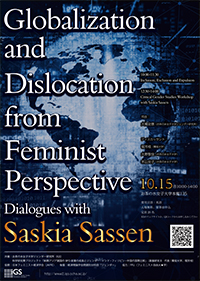 IGS Seminar, Globalization and Dislocation from Feminist Perspective: Dialogues with Saskia Sassen
IGS Seminar, Globalization and Dislocation from Feminist Perspective: Dialogues with Saskia Sassen
Date: Monday, 15 October, 2018 10:00-14:30
Venue: Room 135, Main Building, Ochanomizu University
Programme
| Coordinator | Fumie Ohashi, IGS, Ochanomizu University |
| Speaker | Saskia Sassen, Columbia University, USA |
| 10:00-11:30 | Inclusion, Exclusion and Expulsion |
| 12:30-14:00 | Critical Gender Studies Workshop with Saskia Sassen |
| Discussants | Yoshie Hori, Dokkyo University |
| Sera Ohno, Ochanomizu University | |
| Hisako Motoyama, Ochanomizu University |
*Prior registration required (Admission Free)
**This seminar has limited seating.
Organizer: Institute for Gender Studies, Ochanomizu University, Japan Society for the Promotion of Science [grant number (B): 17H02247, Yoshie Hori].
Cooperation: The Japan Association for Feminist Economics, Gender Subcommittee of Japan Society of Political Economy, Feminist Freedom University.
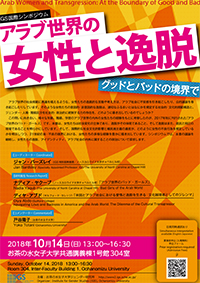 International Symposium “Arab Women and Transgression: At the Boundary of Good and Bad”
International Symposium “Arab Women and Transgression: At the Boundary of Good and Bad”
Date: Sunday, 14 October 2018 13:00-16:30
Venue: Room 304, Inter-Faculty Building 1, Ochanomizu University
Coordinator: Jan Bardsley (Specially Appointed Professor, IGS/Professor, University of North Carolina at Chapel Hill)
Women’s transgressive behaviors and perspectives are challenging societal norms in the Arab world, giving rise to anxiety and public debate. How do both intentional and unintentional transgressions illuminate the social and cultural constructs that define proper and improper behavior? How do they expose the social and political policing of gender, racial, and class divisions?
The new book Bad Girls of the Arab World engages these questions by examining the experiences of women from a range of ages, classes, and educational backgrounds who live in the Arab world and beyond. The book demonstrates that women’s transgression is both an agent and a symptom of change, a site of both resistance and repression. Showing how transnational forces as well as the legacy of colonialism shape women’s badness, Bad Girls of the Arab World offers a rich portrait of women’s varied experiences at the boundaries of propriety in the twenty-first century. At their presentations to the IGS Symposium Bad Girls of the Arab World co-editor Nadia Yaqub and contributor Diya Abdo continue this discussion, exploring the politics of women’s transgression, identity, and belonging in the Arab world and beyond.
| Program | |
| Introductory Remarks | |
|
Jan Bardsley (Specially Appointed Professor, IGS/Professor, The University of North Carolina at Chapel Hill) |
|
| Research Report | |
|
Nadia Yaqub (Professor, The University of North Carolina at Chapel Hill) |
|
|
Diya Abdo (Associate Professor, Guilford College) |
|
| Commentary | |
|
Yoko Totani (Professor, Ochanomizu University) |
Simultaneous interpretation available (English-Japanese)
Prior registration required
Admission Free
Post-symposium get-together: 16:30-17:30
Research Report Abstract
“Bad Girls of the Arab World” (Nadia Yaqub)
My talk will focus on concepts that structure the book Bad Girls of the Arab World that I edited with the late Dr. Rula Quawas, and the various approaches that our contributors have taken to those concepts. I will explain why we chose to focus on transgression, how transgression differs from resistance, and what insights can be achieved through a multi-disciplinary approach to transgression. I conclude by considering the implications of transgression: How does transgression alter the intimate social connections created and sustained by women’s traditional work? How do women’s care for the home, nurturing of people, and collective food rituals offer creative modes for resistance? While such work is fundamental to social relations and cultural transmission, it is always also fraught, encompassing coercion and constraint as well as love and connection. It is also a site of continued, if at times almost invisible, transgression.
“Navigating Love and Badness in America and the Arab World: The Dilemma of the Cultural Transgressor” (Diya Abdo)
In this creative nonfiction/memoir piece, I detail my experiences in the U.S. and in Jordan as a western-trained academic who found it difficult to feel at home in either a post 9/11 America or conservative Jordanian institutions. These two different contexts’ various and competing expectations of Arab and Muslim women scholars and activists meant that I had to walk a constant tightrope lest I be considered anti-Arab and anti-Muslim in Jordan or anti-woman in the U.S. Even as I attempted to strategically navigate my feminism with my nationalism, my womanhood with my Arabness, my feminist longings with my postcolonial condition, it was impossible to be deemed “good” in either location. This led to painful exile and erasure. Through my experiences with my students, my children and the refugees I support through my program Every Campus A Refuge, I have found ways to make a home between cultures and to engage in these struggles in productive and meaningful ways.
Organizer: Institute for Gender Studies (IGS), Ochanomizu University
June
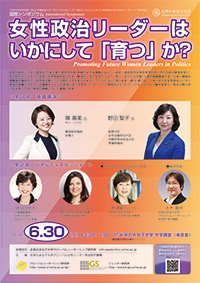 International Symposium: Promoting Future Women Leaders in Politics
International Symposium: Promoting Future Women Leaders in Politics
Development of women’s political leadership has been an important social agenda not only in Japan but also in countries and regions all over the world. Encouraging the young generation, such as high school and university students, to participate in politics and providing leadership training for them can be an effective way to achieve this. In the first session of this symposium, two female national parliament members from Japan and South Korea will deliver keynote speeches about their career experiences. The following panel discussion session takes up issues of women’s political leadership education, starting with the panellists’ reports on the achievement and challenges of Japanese women’s political leader education and on young political leader training in the German Social-Democratic Party.
DATE: Saturday, 30 June, 2018 13:30-17:00
VENUE: Kiindo auditorium, Ochanomizu University (2-1-1 Otsuka, Bunkyo-ku, Tokyo)
Eligibility: All welcome
Keynote Lectures:
Seiko NODA,
Minister for Internal Affairs and Communications, Minister in charge of Women’ s Empowerment, Minister of State for the Social Security and Tax Number System, and member of the House of Representatives
JIN Sun-Mee
The 19th and 20th South Korean National Assembly member, member of the Democratic Party of Korea, and attorney
Panel Discussion:
Yoriko MADOKA
Former member of the House of Councillors and Head of “Political School for Women”
Johanna UEKERMANN
Executive Board Member/Member of the Headquarters of the Social Democratic Party of Germany (SDP)
JIN Sun-Mee
The 19th and 20th South Korean National Assembly member, member of the Democratic Party of Korea, and attorney
Ki-young SHIN, Panel Discussion Moderator
Associate Professor, Institute for Gender Studies
Naoko OKI, General moderator
Project Lecturer, Institute for Global Leadership
Time Schedule
13:30-13:35 Opening Remarks
13:35-13:40 Explanation of purpose
13:40-14:10 Keynote Speaker: Seiko NODA
14:10-14:40 Keynote Speaker: JIN Sun-Mee
14:40-14:55 Break
14:55-15:10 Panelist:Yoriko MADOKA
15:10-15:25 Panelist:Johanna UEKERMANN
15:25-16:35 Panel Discussion Moderator:Ki-young SHIN
16:35-16:55 Questions and Discussion
16:55-17:00 Closing Remarks
*Simultaneous interpretation available (English-Japanese)
*Prior registration required (Admission Free)
Organizer: Institute for Global Leadership and Institute for Gender Studies, Research Organization for the Promotion of Global Women’s Leadership, Ochanomizu University
February
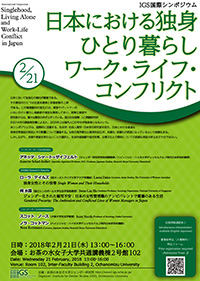 International Symposium “Singlehood, Living Alone and Work-Life Conflict in Japan”
International Symposium “Singlehood, Living Alone and Work-Life Conflict in Japan”
Date: Wednesday 21 February, 2018 13:00-16:00
Venue: Room 102, Inter-Faculty Building 2
Coordinator: Annette Schad-Seifert (Specially Appointed Professor, IGS / Professor, Japanese Studies, Heinrich Heine University Düsseldorf)
Japan has been showing a marked trend toward developing into a single society. One of the causes for this trend is an increase in the proportion of never-married persons, and of persons who do not intend to ever marry. These changes in marriage behavior have raised grave concerns among policymakers and scholars as this trend is correlated with the probability of living alone in old age, i.e., without a partner or family. According to a survey report published by the National Institute of Population and Social Security Research in 2016, it was estimated that half of the population in Japan will be single by 2035.
The symposium invites international scholars of expertise in sociology, social anthropology and Japanese studies to present the causes and potential consequences of the dramatic rise of solo living in Japan. It has been assumed that higher education levels and growing economic independence of women have triggered a society in which fewer marriages take place. However, detailed empirical analyses of relationships between avoiding marriage or union formation and social values, working patterns, or corporate culture are still limited.
| Introductory Remarks | |
| Annette Schad-Seifert (Specially Appointed Professor, IGS / Professor, Japanese Studies, Heinrich Heine University Düsseldorf) |
Japan’s Never-Married Singles in National Population Surveys |
| Research Reports | |
| Laura Dales (Lecturer, Asian Studies, The University of Western Australia) |
Single Women and Their Households |
| Swee-Lin Ho (Assistant Professor, Sociology Department, National University of Singapore) |
Gendered Precarity: The Ambivalent and Conflicted Lives of Women Managers in Japan |
| Commentators | |
| Scott North (Professor of Sociology, Osaka University) | |
| Nora Kottmann (Lecturer, Japanese Studies, Heinrich Heine University Düsseldorf) | |
Simultaneous interpretation available (English-Japanese)
(Admission Free)
Feb. 2 International Symposium Pre-reading List
Reading materials available at IGS office.(contact: yoshihara.kumi@ocha.ac.jp)
【English book】
- Jamieson, Lynn; Simpson, Roona (2013): Living Alone – Globalization, Identity and Belonging. Palgrave Macmillan. (Introduction, pp 1-22)
- Klinenberg, Eric (2012): Going Solo: The Extraordinary Rise and Surprising Appeal of Living Alone. Penguin Press. (Introduction: The Singleton Society, pp 1-27)
【Japanese book】
- 荒川和久『超ソロ社会「独身大国・日本」の衝撃』PHP新書、2017、(第1章、18~51頁)
- 長田夏来『生涯未婚時代』イースト新書、2017、(第1章、18~48頁)
- 山田昌弘『「家族」難民: 生涯未婚率25%社会の衝撃』朝日新聞出版2014、(第2章「『家族』と『シングル』をめぐる戦後日本の二つの常識」、56~73頁)
【English video】
【Japanese-English Video】
Organizer: Institute for Gender Studies (IGS), Ochanomizu University
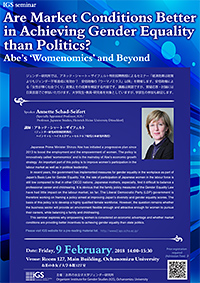 IGS seminar: Are Market Conditions Better in Achieving Gender Equality than Politics? Abe’s ‘Womenomics’ and Beyond
IGS seminar: Are Market Conditions Better in Achieving Gender Equality than Politics? Abe’s ‘Womenomics’ and Beyond
Date: Friday, 9 February, 2018 14:00-15:30
Venue: Room 127, Main Building, Ochanomizu University
Speaker: Annette Schad-Seifert (Specially Appointed Professor, IGS / Professor, Japanese Studies, Heinrich Heine University Düsseldorf)
Japanese Prime Minister Shinzo Abe has initiated a progressive plan since 2013 to boost the employment and the empowerment of women. The policy is innovatively called ‘womenomics’ and is the mainstay of Abe’s economic growth strategy. Evidently, the recommendations of various international economic organisations have had a significant impact on shaping Abe’s new gender policy. The World Economic Forum, the International Monetary Fund, the Organisation for Economic Co-operation and Development (OECD) and the Goldman Sachs Investment Bank are urging Japan’s public and private business organisations to reform their corporate structures in order to adapt the economic sector to the requirements of an ageing society. An important part of this policy is to improve women’s participation in the labour market as well as in political leadership.
In recent years, the government has implemented measures for gender equality in the workplace as part of Japan’s Basic Law for Gender Equality. Yet, the rate of participation of Japanese women in the labour force is still low compared to that in other OECD nations. Japanese mothers, especially, find it difficult to balance a professional career and childrearing. It is obvious that the family policy measures of the Gender Equality Law have had little impact on the labour market, so far. The Liberal Democratic Party (LDP) government is therefore working on framing a policy aimed at improving Japan’s diversity and gender equality scores. The basis of this policy is to develop a highly qualified female workforce. However, the question remains whether the business sector will provide an environment flexible enough and attractive enough for women to pursue their careers, while balancing a family and childrearing.
This seminar explores why empowering women is considered an economic advantage and whether market conditions are providing better incentives to achieving gender equality than state politics.
Prior registration required (Admission Free) *Closed Seminar, Ochadai students only
Pre-Reading List
- Aizawa, Nobuhiro (28 September 2016): Accommodating Japan’s youth and women in a silver democracy. In: East Asia Forum.
- Dalton, Emma (2 October 2016): Japan’s new icon for gender equality. In: East Asia Forum.
- Dalton, Emma (2017): Womenomics, ‘Equality’ and Abe’s Neo-liberal Strategy to Make Japanese Women Shine: In: Social Science Japan Journal 20 (1), pp. 95–105.
- East Asia Forum (3 October 2016): Women can save Japan.
- Koshi, Naomi (2 October 2016): Can embracing diversity solve Japan’s population problems? In: East Asia Forum.
- Mackie, Vera (1 August 2016): Closing the gender gap in Japan. In: East Asia Forum.
- Macnaughtan, Helen (28 January 2015): Abe’s Womenomics needs to include men too. In: East Asia Forum.
- Macnaughtan, Helen (27 August 2015): Is Abe’s Womenomics working? In: East Asia Forum.
- Morikawa, Masayuki (1 September 2016): Japanese companies need to get women on board. In: East Asia Forum.
- Nagase, Nobuko (29 September 2016): How to make Womenomics work. In: East Asia Forum.
- Yashiro, Naohiro (22 October 2014): Why ‘Womenomics’ is the way forward for Japan. In: East Asia Forum.
Printed copy is available at IGS office. (Contact: yoshihara.kumi@ocha.ac.jp)
Organizer: Institute for Gender Studies (IGS), Ochanomizu University
January
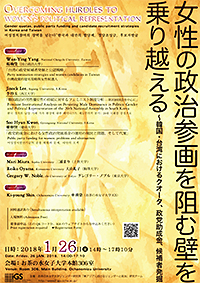 IGS Symposium “Overcoming hurdles to women’s political representation: Gender quotas, public party funding and candidate recruitment strategies in Korea and Taiwan”
IGS Symposium “Overcoming hurdles to women’s political representation: Gender quotas, public party funding and candidate recruitment strategies in Korea and Taiwan”
Date: Friday, 26 JAN, 2018, 14:00-17:10
Venue: Room 306, Main Building, Ochanomizu University
| Facilitator | |
|
Hiroaki Itai, Ochanomizu University
|
|
|
Opening Remarks
|
|
|
Ki-young Shin, Ochanomizu University
|
|
| Speaker | |
| Wan-Ying Yang, National Chengchi University, Taiwan |
“Party nomination strategies and women candidacies in Taiwan” |
| Jinock Lee, Sogang University, S.Korea |
“Feminist Institutional Analysis on Persisting Male Dominance in Politics: Gender and Political Representation of the 20th National Assembly in South Korea” |
| Soo Hyun Kwon, Gyeongsang National University, S.Korea |
“Public party funding for women: problems and alternatives” |
| Discussants: All from Japan | |
| Mari Miura, Sophia University | |
| Reiko Oyama, Komazawa University | |
| Gregory W. Noble, the University of Tokyo | |
| Facilitator for discussion | |
| Ki-young Shin, Ochanomizu University | |
*Simultaneous interpretation available(English-Japanese)
*Prior registration required ☛Registration Form
(Admission Free)
Organizer: Institute for Gender Studies, Ochanomizu University
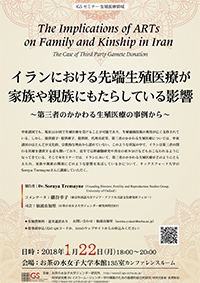 IGS Seminar, The Implications of ARTs on Family and Kinship in Iran: The Case of Third Party Gamete Donation
IGS Seminar, The Implications of ARTs on Family and Kinship in Iran: The Case of Third Party Gamete Donation
Date: Monday 22 JAN, 2018, 18:00-20:00
Venue: Room 135, Main Building, Ochanomizu University
Speaker
Soraya Tremayne, Founding Director, Fertility and Reproduction Studies Group, University of Oxford.
Commentator
Sachiko Hosoya, Research Fellow, Research Institute for Languages and Cultures of Asia and Africa, Tokyo University of Foreign Studies.
Facilitator
Yukari Semba, Project Research Fellow, IGS, Ochanomizu University.
*Prior registration required ☛Registration Form
(Admission Free)
Organizer: Institute for Gender Studies, Ochanomizu University, Towards the construction of ‘Islam & Gender Studies’: Building foundations for comprehensive discussion on gender justice and Islam(Grants-in-aid for Research/Basic Research A)
July
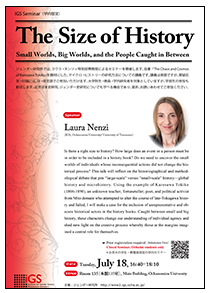 IGS Seminar, “The Size of History:Small Worlds, Big Worlds, and the People Caught in Between”
IGS Seminar, “The Size of History:Small Worlds, Big Worlds, and the People Caught in Between”
Date: Tuesday, July 18, 16:40-18:10
Venue: Room 135(本館135室), Main Building, Ochanomizu University
Speaker: Laura Nenzi (IGS, Ochanomizu University/ University of Tennessee)
Is there a right size to history? How large does an event or a person must be in order to be included in a history book? Do we need to uncover the small worlds of individuals whose inconsequential actions did not change the historical process? This talk will reflect on the historiographical and methodological debate that pits “large-scale” versus “small-scale” history—global history and microhistory. Using the example of Kurosawa Tokiko (1806-1890), an unknown teacher, fortuneteller, poet, and political activist from Mito domain who attempted to alter the course of late-Tokugawa history and failed, I will make a case for the inclusion of unrepresentative and obscure historical actors in the history books. Caught between small and big history, these characters change our understanding of individual agency and shed new light on the creative process whereby those at the margins imagined a central role for themselves.
☛ Prior registration required(Admission Free) Registration Form
*Closed Seminar, Ochadai students only
Organizer: Institute for Gender Studies
June
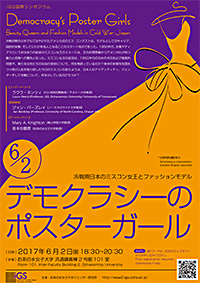 IGS International Symposium, “Democracy’s Poster Girls: Beauty Queens and Fashion Models in Cold War Japan”
IGS International Symposium, “Democracy’s Poster Girls: Beauty Queens and Fashion Models in Cold War Japan”
Date: Friday, 2 JUN, 18:30-20:30
Venue: Room 101, Inter-Faculty Building 2, Ochanomizu University
Big business in early Cold War Japan, American-style beauty pageants launched modeling careers, national heroes, and overnight celebrity. The beauty queen’s iconic uniforms from swimsuit to tiara shaped her as a cultural figure and a cautionary tale about the allure and dangers of Americanization in 1950s Japan. What do her victories tell us about Japan-U.S. diplomatic and commercial alliances and attitudes toward women’s new freedoms in the 1950s? Popular again in Japan, but including a broader range of bodies, what do today’s beauty pageants signal about notions of Japanese identity, gender, and labor?
| Coordinator | Laura Nenzi (Professor, IGS, Ochanomizu University/ University of Tennessee) |
| Speaker | Jan Bardsley (Professor, University of North Carolina, Chapel Hill) |
| Discussant | Mary A. Knighton (Professor, Aoyama Gakuin University) |
| Kazue Sakamoto (Professor, Ochanomizu University) |
*Simultaneous interpretation available(English-Japanese)
*Prior registration required
(Admission Free)
Organizer: Institute for Gender Studies, Ochanomizu University
April
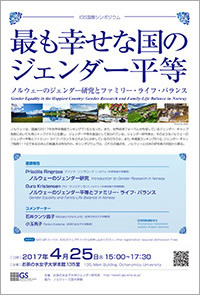 IGS International Symposium “Gender Equality in the Happiest Country: Gender Research and Family-Life Balance in Norway”
IGS International Symposium “Gender Equality in the Happiest Country: Gender Research and Family-Life Balance in Norway”
Date: Tuesday, 25 April, 15:00-17:30
Venue: Room 135, Main Building, Room 604 (6th floor), Graduate School of Humanities & Sciences Building, Ochanomizu University
Norway is ranked at the top in the World Happiness Report 2017 published by the United Nations. It is also known as one of the most advanced countries in terms of gender equality as shown in the top ranking every year in the Global Gender Gap Report published by the World Economic Forum. In contrast, Japan is the 51st in the happiness ranking and the 111th in the gender gap ranking. What does the research reveal about gender equality and family-life-balance in Norway? What are the differences between Norway and Japan? A dialogue between Norwegian and Japanese scholars in this symposium will explore these issues.
| Keynote Speech | |
| Priscilla Ringrose (NTNU, Norway) |
“Introduction to Gender Research in Norway” |
| Guro Kristensen (NTNU, Norway) |
“Gender Equality and Family-Life Balance in Norway” |
| Commentators | |
| Masako Ishii-Kuntz (Ochanomizu University) | |
| Ryoko Kodama (Ochanomizu University) | |
*Simultaneous interpretation available(English-Japanese)
*Prior registration required ☛We have closed registration form because there is no more seats available.
(Admission Free)
Organizer: Institute for Gender Studies, Ochanomizu University
Cooperation: Royal Norwegian Embassy in Tokyo


